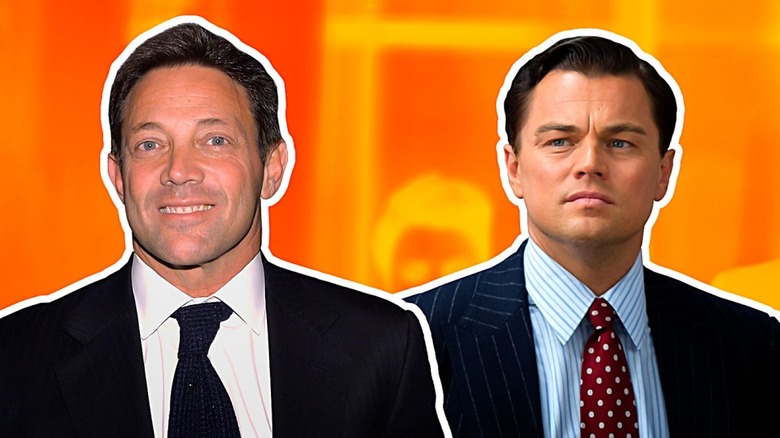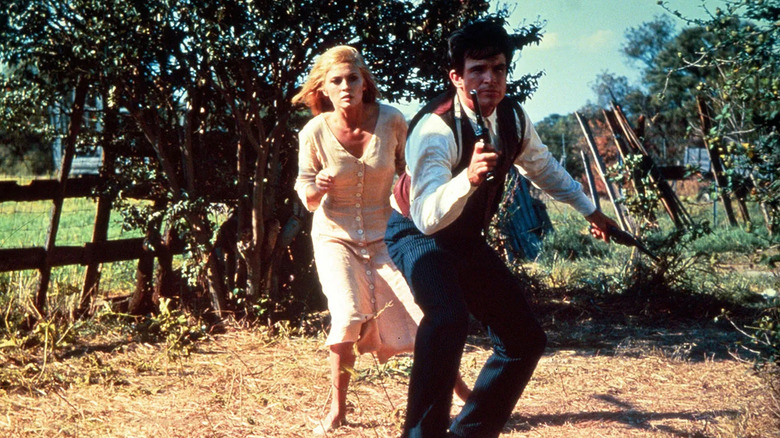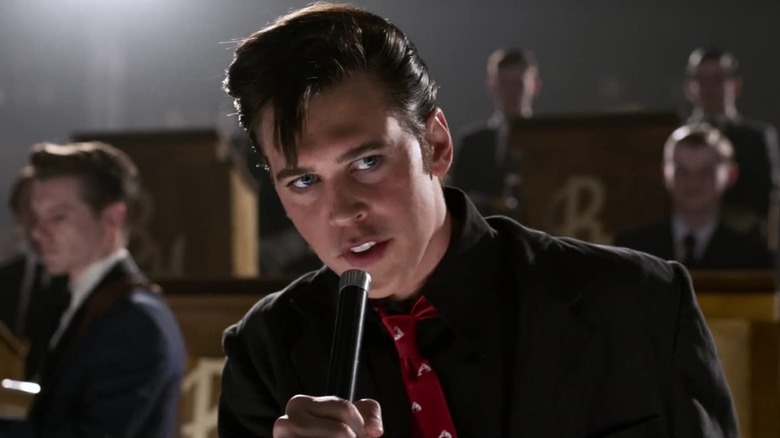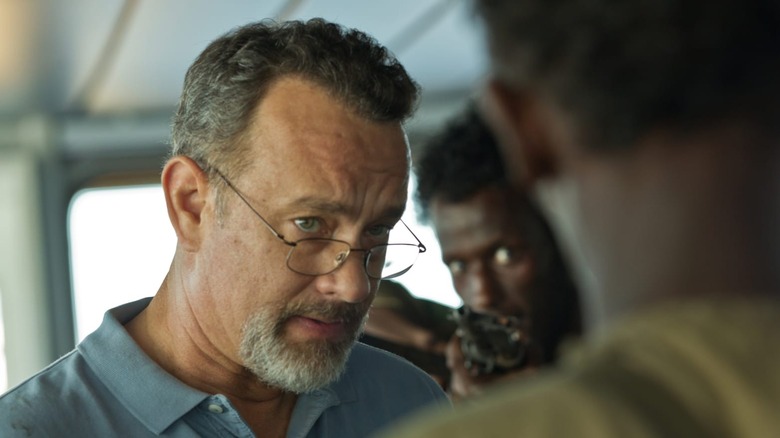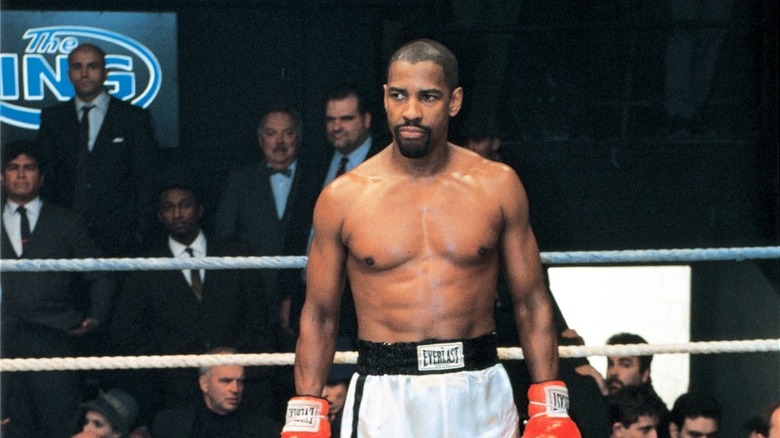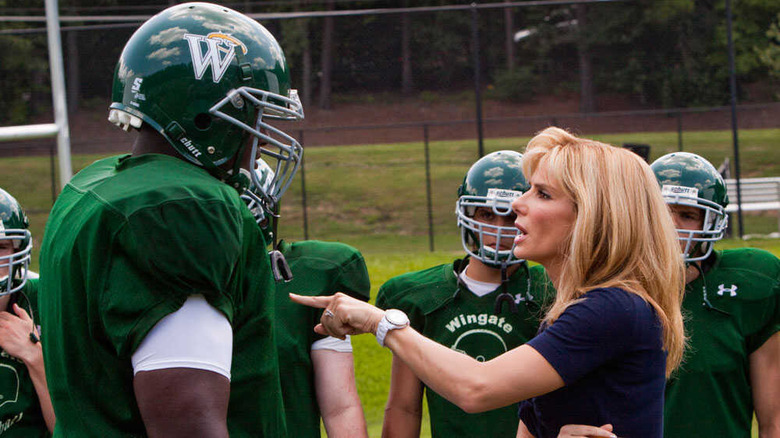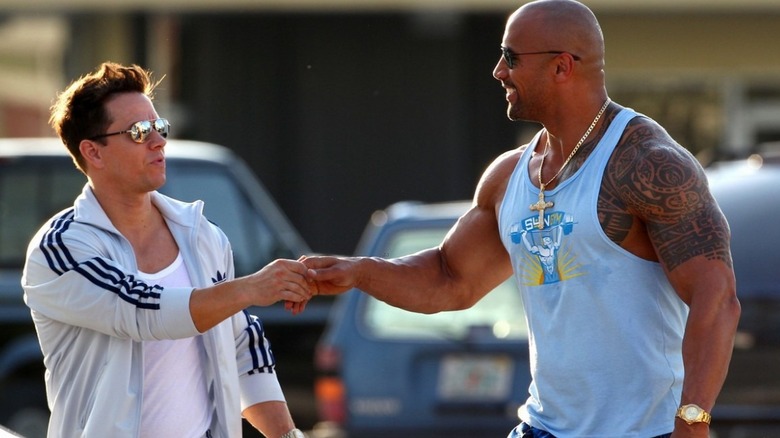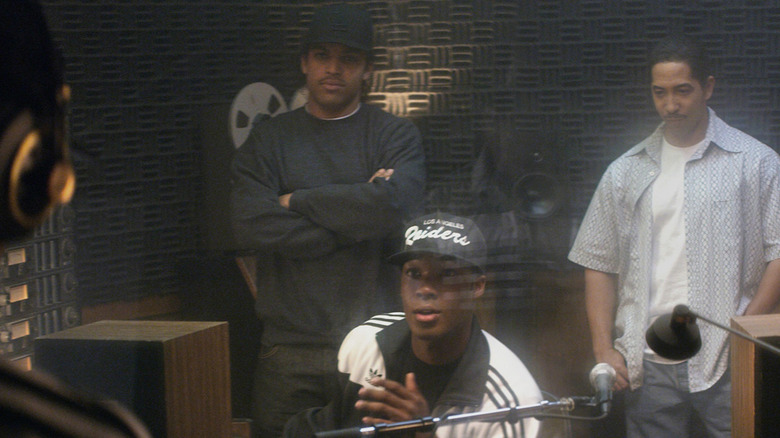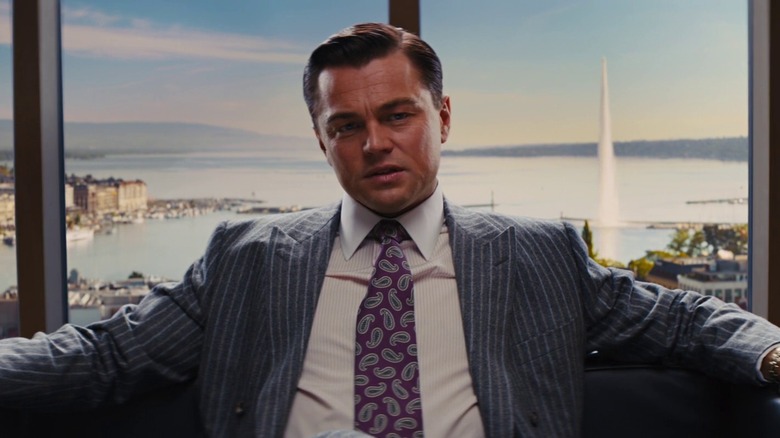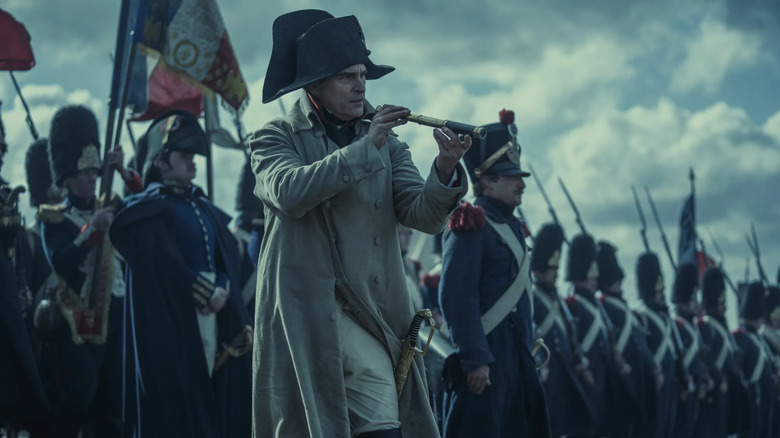Real People Who Were Worse Than Their Biopic Portrayed
The biopic is a favorite genre for filmmakers. It's certainly an intriguing one, capable of recounting the lives of some of history and pop culture's most memorable figures into a viewer-friendly medium, usually going from cradle to grave in around two hours. But as anyone who's watched more than a few major biopics can likely attest to, this style of film is nearly impossible to get perfect.
Biopics fall into all manner of pitfalls. The most major of these tends to be inaccuracy on the part of the filmmakers — some films blatantly disregard the truth or fudge it a bit, which is the result of condensing a person's life into just a few hours. Sometimes, the filmmakers have to make some stuff up to yoke a narrative to the subject's life — not everyone's story fits into a neat three-act structure without a little work. Regardless of the reason, the genre has an unavoidable penchant for inaccuracy.
Biopics, especially those about towering, complex historical figures, often ignore some of their subjects' most regrettable traits. Maybe it's because the filmmakers fear an audience won't root for someone who does bad things. Maybe there are some controversies that filmmakers just want to avoid stepping in. We're looking at some of the most well-known celebrities, criminals, and historical figures who were worse than their biopics make them look. And reader, beware — we'll be diving headfirst into spoilers for some of these films to fully cover exactly what happened in their lives.
Clyde Barrow and Bonnie Parker in Bonnie and Clyde
Hitting theaters in the summer of 1967, "Bonnie and Clyde" chronicles the rise and fall of the infamous outlaw duo, who rose to prominence during the Great Depression for their wave of robberies across multiple state lines. Starring Academy Award-winning actors Warren Beatty and Faye Dunaway as the pair of infamous lovers and partners in crime, the film earned high marks upon its release, even snagging itself a pair of Oscars and plenty more nominations the following year. Despite all the praise, how does the film fare when it comes to depicting the real lives of its controversial figures? As it turns out, not too well.
Instead of the romanticized, Robin Hood-esque image of cunning bank robbers that we're presented with in Arthur Penn's film, the real Bonnie Parker and Clyde Barrow instead often held up small-time businesses for an easier score. "Most of their burglaries were committed in mom-and-pop grocery stores and filling stations along the back roads," said Jeff Guinn, author of "Go Down Together: The True, Untold Story of Bonnie and Clyde," in an interview with NPR. "The movie is wonderful entertainment," he said, "but it's less than 5 percent historically accurate." In addition to the inaccurate representation of the pair's crimes, the film largely glosses over the truth that the pair were ruthless killers. They had over a dozen murders to their name by the time of the nasty shootout in 1934 that cut their reign of terror to an end.
Elvis Presley in Elvis
Undoubtedly one of the most famous musicians of all time, there's been no shortage of films centered around the iconic rock star since his untimely passing in the late '70s. Among the most recent, and the most talked-about, is the Baz Luhrmann-directed "Elvis" from 2022. Austin Butler takes on the starring role alongside Tom Hanks, who portrays Elvis' manager, "Colonel" Tom Parker. And while it's certainly no secret to fans of the King of Rock and Roll, there's one particularly unsavory aspect of the musician's life that "Elvis" does its best to shy away from.
While the film admittedly gives us a few glimpses into Elvis' relationship with his wife, Priscilla Presley (Olivia DeJonge), the majority of her screen time is dedicated to the later years of their relationship. In limiting Priscilla's role in the drama, the film largely glosses over the fact that the two began dating when the music legend was 24 — a whole decade older than then-14-year-old Priscilla Wagner. Though it's a controversial aspect of the star that even Priscilla herself has repeatedly downplayed the severity of over the years, it nonetheless is an uncomfortable detail that the biopic was keen to ignore, among plenty of other things "Elvis" gets wrong about the real story. Luckily, a year later, Sofia Coppola's film "Priscilla" was released, telling the Elvis story from her perspective and attempting to correct the narrative.
Richard Phillips in Captain Phillips
In the spring of 2009, not far off the coast of Somalia, a small group of pirates boarded and hijacked a passing cargo ship, the Maersk Alabama. What followed was a four-day standoff among the pirates, the crew, and the United States Navy, which finally ended when a team of snipers dispatched three of the four pirates. Four years later, the events that unfolded on the high seas were adapted into a feature film, with Tom Hanks cast as the Alabama's captain, Richard Phillips. The film portrays him as a hero, doing everything he can to keep his crew safe and ultimately earning the credit for keeping them alive throughout the harrowing ordeal. It all amounts to a thrilling biopic packed with action and drama, but the real incident may not have gone down as we see on screen.
Both before and after the Paul Greengrass film's 2013 release, several crew members who survived the fateful incident came out to dispute the film's version of what happened. In an anonymous interview with the New York Post, a former crew member stated that Phillips "wasn't the big leader like he is in the movie," going on to allege that he was partially at fault for the incident as a result of sailing too close to the Somalian coast despite crew members begging him to reconsider. Upon sighting the pirate boats, another crew member alleged, Phillips was dismissive, believing the vessel to be a harmless fishing boat. While neither testimony is absolute, both paint a very different picture of the ship's captain than the Oscar-nominated film suggests.
P.T. Barnum in The Greatest Showman
"X-Men" favorite Hugh Jackman wrapped up his time playing Wolverine (at least for a while) with "Logan," a gritty and dour action flick that couldn't be more different than his next role. Starring as famed showman P.T. Barnum in 2017's "The Greatest Showman," the cast was rounded out by stars such as Zac Efron, Michelle Williams, Zendaya, and Rebecca Ferguson, who together played a mix of real and fictional figures in Barnum's life. And though "The Greatest Showman" may not fit as well into the genre of biopics as well as the rest of the films we're covering thanks to being a musical first and foremost, it glosses over so much of what the real P.T. Barnum was like that it warrants a spot on our list.
Following Barnum's rise from a down-on-his-luck unemployed worker to the world's greatest entertainer, there are plenty of scenes in which we're shown Barnum's love for the more unusual members of his show. It all amounts to a central theme of self-acceptance, but in reality, the real P.T. Barnum was far from the humanitarian that the film reimagines him to be. Amidst the laundry list of regrettable actions he took, two of the most egregious included propping up a disabled child as a smoking and drinking oddity, and at one point effectively buying an elderly woman before pulling out her teeth to make her into a more convincing exhibit.
Rubin Carter in The Hurricane
Starring Denzel Washington, Norman Jewison's 1999 drama "The Hurricane" saw the Academy Award-winning actor take on the role of Rubin Carter, a top-level boxer wrongly convicted of murder in the middle of his career. For years he fought a system working against him before finally being released nearly 20 years later.
As is the case with many biopics, plenty of embellishment and downright fiction finds its way into the mix for "The Hurricane." In stark contrast to what we see on screen, Carter's life prior to his infamous arrest found him on the wrong side of the law more than once. Shortly after enlisting in the United States Army, he was hit with a number of court martials that ultimately led to his expulsion from the service. Later on, he served time in prison for two muggings.
However, the creative liberties taken with "The Hurricane" are a bit easier to understand from a filmmaking perspective as "The Hurricane" would have been an especially difficult story to tell if Carter's complicated, less-than-virtuous past had been put on full display. The obfuscation of Carter's real life is totally unnecessary for the film and more than a little problematic — the miscarriage of justice and wrongful imprisonment of Carter isn't contingent on him having a sterling reputation. Nevertheless, casting a light on his previous scuffles with the law might have made "The Hurricane" a hard sell for general audiences.
The Tuohys in The Blind Side
Adapted from a novel, "The Blind Side" recounts the inspiring story of Michael Oher (Quinton Aaron), a teenager bouncing between foster care and living on the streets. But after crossing paths with Sean (Tim McGraw) and Leigh Anne Tuohy (Sandra Bullock), they help him turn his life around and even translate his newfound skills on the football field into a career playing for the NFL. The film captured the hearts and minds of audiences back in 2009, even going head to head against films like the blockbuster "Avatar," the socially conscious "District 9," and eventual winner "The Hurt Locker" in the running for the best picture award that year. But as the years have marched on, the truth of the relationship between Oher and the Tuohys has come to light and consequently turned the entire story on its head.
Instead of being an inspiring story of perseverance against the odds with a huge thanks owed to the Tuohy family, Michael Oher has alleged that they were far from the kind souls we see on screen. According to a court petition, the Tuohys filed for a conservatorship over the newly 18-year-old Oher without his full understanding of the document, allowing them to profit millions off of the movie and book deals while cutting him out of the money entirely. Worse still, Oher's attorney, Gerard Stranch, stated that the lie, combined with the fact that he was never even technically fully adopted into the Tuohy family, "devastated Mike and wounded him deeply."
The Sun Gym Gang in Pain & Gain
In 2013, director Michael Bay took a break from "Transformers" movies to make "Pain & Gain," a crime caper comedy starring Mark Wahlberg, Dwayne "The Rock" Johnson, Anthony Mackie, and Tony Shalhoub. Wahlberg plays Adrian Doorbal, a bodybuilder who recruits two friends from his local gym (Johnson and Mackie) for a scheme to kidnap and extort a wealthy businessman (Shalhoub).
Based on the so-called "Sun Gym Gang" and the real-life attempted murder of Marc Schiller, the film was adapted from a series of articles in the Miami New Times. But it also put a comedic twist on events, often downplaying the viciousness of their crimes and turning the affair into something of a joke. While the film attempts to portray the criminal trio as a group of bumbling, misguided malcontents, the reality was far more grisly.
For the film, Bay may have wanted to make the characters more sympathetic and acting out of pure desperation. The true story, however, is that the Sun Gym Gang was calculating and cruel. And the film outright invents some of their goofier moments, like their use of Halloween costumes when kidnapping their target. Their later murder of another man, portrayed as an accident in the film, was anything but a mistake. Even the wealthy Shalhoub character (Victor Kershaw in the film) wasn't so innocent and was nabbed by the FBI not long after the incident for a $14 million insurance scam, ultimately serving nearly four years behind bars.
Andre Young in Straight Outta Compton
The hip-hop world is full of controversial figures and biopics about them, from "Notorious" covering The Notorious B.I.G. to F. Gary Gray's 2015 megahit, "Straight Outta Compton." The biopic tells the story of the '80s rap group "N.W.A.," from its scrappy origins to its runaway success and ending with the death of Eazy-E (Jason Mitchell). But with members of the original group producing the film, it should come as no surprise that "Straight Outta Compton" ignores much of the group's worst behavior, no more so than when it comes to Andre Young aka Dr. Dre (Corey Hawkins).
One famous incident involving Dre was completely erased from the film, and what makes it so alarming is how open the rapper was about it in the past. In 1991, after a violent encounter involving rap journalist Dee Barnes, Dre openly commented about how he threw the reporter through a door, and he subsequently pled no contest to battery charges. After the film was released, Barnes authored a piece for Gawker that had much to say about the film's portrayal of Dr. Dre: "When I was sitting there in the theater, and the movie's timeline skipped by my attack without a glance, I was like, 'Uhhh, what happened?'" Barnes remarked. "Like many of the women that knew and worked with N.W.A., I found myself a casualty of 'Straight Outta Compton”s revisionist history." She also pointed to one of his labelmates, Tairrie B, as a victim of Dre's drunken assault at a Grammys party as well as an ex-girlfriend whom he also assaulted. Neither incident made it into "Straight Outta Compton."
Jordan Belfort in The Wolf of Wall Street
Legendary filmmaker Martin Scorsese further cemented himself as one of the most iconic modern directors back in 2013 with the release of "The Wolf of Wall Street." It features a star-studded cast with Jonah Hill, Margot Robbie, and Matthew McConaughey to name a few, led by Leonardo DiCaprio as the crooked stockbroker Jordan Belfort. For years he and his cohorts committed financial fraud on a massive scale, all while trying to dodge an intense FBI investigation into their affairs.
It's rare that the subject of a biopic opens up to the public and states that their cinematic counterpart didn't go far enough, but that's exactly what the real-life Jordan Belfort did. (He also appears at the end of the film as a convention host.) Shortly after the film's 2013 release, Belfort spoke to The Hollywood Reporter about how the film measured up to his real experiences, to which he bluntly stated that though the film was highly accurate, he was "even worse" than what we got to see. In real life, his relationship with his child and wife, Nadine (Robbie), was more abusive, and the people he and his cronies at Stratton Oakmont ripped off included disadvantaged everyday people as well as the wealthy.
Napoleon Bonaparte in Napoleon
Across recorded history, few leaders have left such an indelible mark as France's Napoleon Bonaparte. Respected by his military and feared by his enemies, there's good reason why he's become such a memorable historical figure. And though he wouldn't be the first to put the leader to screen, in 2023, Ridley Scott sought to direct the latest and greatest cinematic adaptation of the first French emperor's life. Unfortunately, the "Blade Runner" director's much-anticipated biopic focusing on the legendary French emperor failed to conquer, both at the box office and with critics.
Despite being one of the most daring and successful military commanders of the era, and perhaps across the annals of history, Napoleon (Joaquin Phoenix) was particularly underhanded when it came to the divorce of his wife, Josephine (Vanessa Kirby). After well over a decade of marriage (that wasn't exactly loyal), he decided to end things with her after she proved unable to bear a child to eventually succeed his spot on the throne. But Napoleon did not divorce Josephine — he instead had the lengthy marriage annulled thanks to a minor technicality dating back to the original ceremony. Historian Dan Snow also pointed out that Napoleon never shot at the pyramids or attended Marie Antoinette's execution, as he does in the film. Napoleon also reinstated slavery in Martinique and Guadeloupe, which doesn't factor into "Napoleon" either. This is all water off a duck's back for Scott, who told The New Yorker that anyone who criticizes the historical accuracy of "Napoleon" needs to "get a life."
